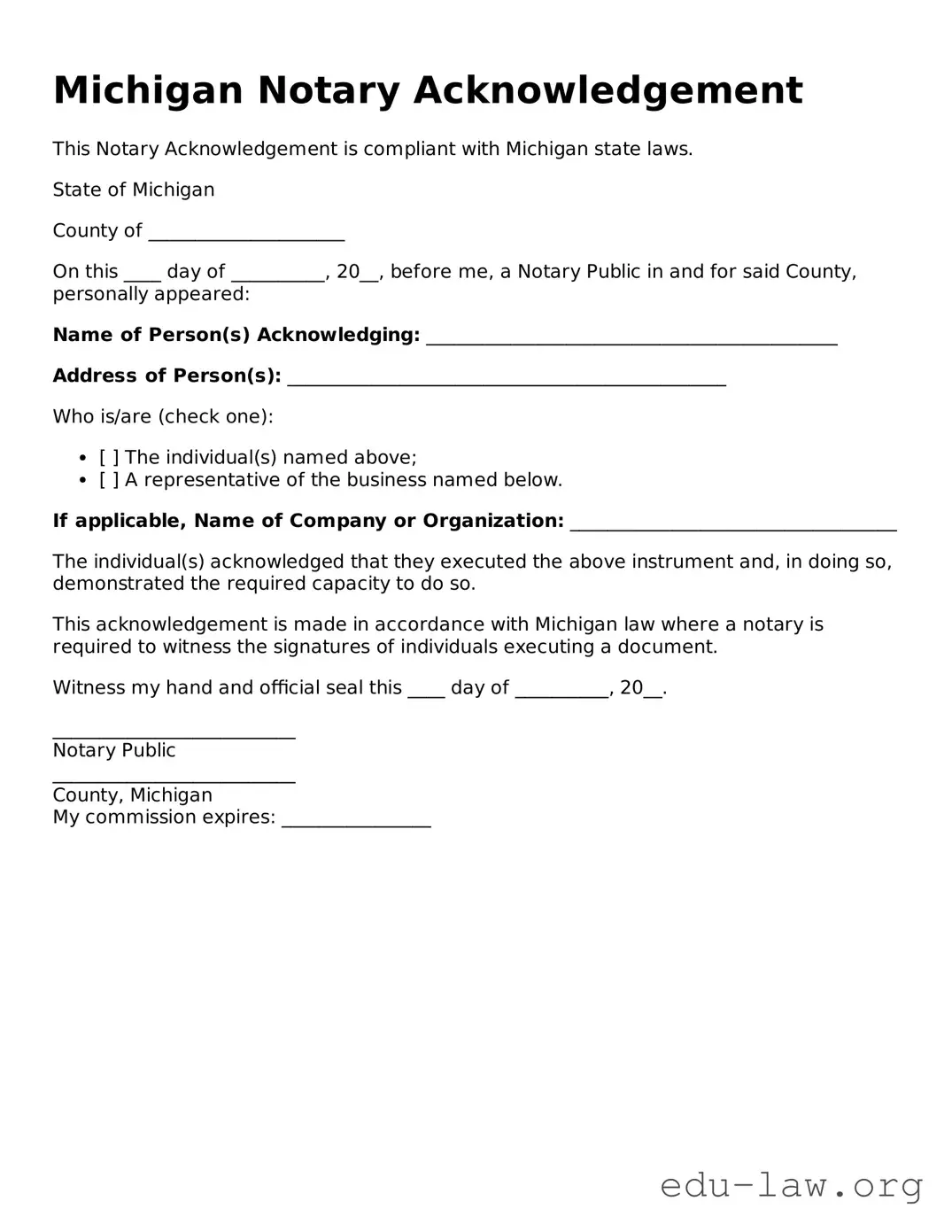What is a Michigan Notary Acknowledgement form?
The Michigan Notary Acknowledgement form is a legal document used to declare that a person has appeared before a notary public and acknowledged that they signed a document voluntarily. This form serves as proof that the notary has confirmed the identity of the signer and witnessed the signing process. It helps ensure the authenticity of documents in legal proceedings or transactions.
When do I need to use a Notary Acknowledgement in Michigan?
You need to use a Notary Acknowledgement whenever a document requires verification that the signer is who they claim to be and has freely signed the document. Common scenarios include real estate transactions, powers of attorney, and other legal documents that require witnesses to their signing.
Who can act as a notary in Michigan?
In Michigan, a notary public can be an individual who has completed the necessary training and passed an examination. They must be at least 18 years old, a resident of Michigan or employed in the state, and not currently incarcerated for felony convictions. Notaries play a crucial role in affirming the legitimacy of signatures on documents.
Is there a specific format for the Notary Acknowledgement form?
Yes, the Notary Acknowledgement form should follow the structure outlined in Michigan laws. Typically, it includes information such as the notary's name, signature, the date of the acknowledgment, and the notary’s commission expiration date. It may also include a certificate confirming the details of the acknowledgment.
Can a document be notarized without the Notary Acknowledgement form?
While notarization can occur without a specific Notary Acknowledgement form, using one provides clarity and enhances the enforceability of the document. Acknowledgment forms act as evidence that the signing took place and that the signers understood the contents of the document they were signing.
What happens if I forget to sign the Notary Acknowledgement form?
If you forget to sign the Notary Acknowledgement form, the notarization is typically deemed incomplete. In this case, you may need to reappear before the notary, properly sign the form, and have the document acknowledged again. This ensures that the legal standing is preserved.
Can I get a Notary Acknowledgement form online?
Yes, many notaries and legal services offer templates for the Michigan Notary Acknowledgement form online. These can often be customized for your needs. However, ensure that any form you use complies with state requirements to avoid potential issues.
Do I need to pay for notarization services?
Yes, most notaries charge a fee for their services. This fee can vary based on the complexity of the document and the notary's experience. It's advised to ask about the charges upfront to avoid any surprises. In some cases, the fee might be considered part of a larger service charge, especially in legal or real estate transactions.
How long is a Notary Acknowledgement valid?
The validity of a Notary Acknowledgement does not have a specific expiration date; rather, it remains valid as long as the document it acknowledges remains in force. However, keep in mind that some documents may have their own expiration periods, and it is wise to consult legal advice regarding the specific document you are dealing with.
What are the consequences of failing to use a Notary Acknowledgement?
Not using a Notary Acknowledgement may lead to challenges in establishing the authenticity of a document. If the validity of a signed document is questioned in court, the lack of notarial acknowledgment can weaken its enforceability. This could potentially complicate transactions or legal processes, so it is always best practice to have documents notarized when required.
